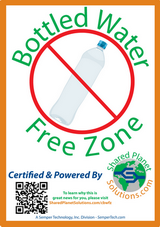Certified Bottled Water Free Zone Program

|
If you are visiting this page because you saw one of our Certified Bottled Water Free Zone signs, then congratulations! This means that an individual or group cared enough to do the right thing and avoided bottled water.
As you probably figured out already, a Certified Bottled Water Free Zone is simply a place where bottled water is not sold or given away, and otherwise discouraged.
Why is this great news for you? The main reasons are:
- It saves over 47 millions of gallons of oil to make the 31 billion bottled water consumed each year in the US alone.
- It saves energy by not having to manufacture and deliver the bottled water.
- It saves additional resources and energy by not having recycle anything (but sadly, recycling doesn't happen that often)
- It saves our landfills from something that should be recycled.
- It saves our environment from a growing litter problem.
This use-and-toss behavior has become so ingrained into our society, that the mere notion of a place where bottled water is discouraged and not available is something special and sure to draw some attention.
Not only is a Certified Bottled Water Free Zone good for the organizers, participants, and the planet, it is hoped that the concept will be noticed and will ultimately lead to a continued avoidance of bottled water beyond the established Certified Bottled Water Free Zone, in effect, creating personal Certified Bottled Water Free Zones.
Intereseted in creating a Certified Bottled Water Free Zone?
It's as easy as one-two-three. Really!
Whether the Certified Bottled Water Free Zone is you personally, an event, a job site, an office building, store, restaurant, school, home, a playground, ball field, etc., the three basic steps are:
- Do not provide or allow bottled water to given away or sold. This includes all food/beverage vendors. It would be outstanding if all disposable plastic bottles were banned, like sodas and juices, but to keep things fair for those that crave sodas and other beverages, only bottled water is banned.
- Discourage staff, volunteers, vendors, and visitors (anyone involved) from bringing their own bottled water. Everyone should be notified that bottled water should be avoided. This is the perfect opportunity to educate everyone about the consequences of bottled water as well as the many eco and wallet-friendly options that are available to just say no to bottled water.
- Register your Certified Bottled Water Free Zone with us, and we’ll provide you with a free downloadable Certified Bottled Water Free Zone logo as well as a sign that you can print and display. We can also ship the sign or signs to you for a nominal fee. We’ll also publish your Certified Bottled Water Free Zone, giving you well-deserved recognition for doing the right thing.
Ready to join the movement? Then click this button.
How to be successful
Of course, we’re here to help you be successful, because when you are successful at avoiding bottled water, we all succeed. So here are some tips on making your Certified Bottled Water Free Zone a great success.
All Certified Bottled Water Free Zones benefit from these best practices.
- Broadcast to everyone involved (staff, volunteers, vendors, participants, visitors, etc.) about the Certified Bottled Water Free Zone and why. It is important that everybody is notified in advance so they can plan ahead.
- BYOB – Bring Your Own Bottle: Help people establish the great habit of bringing your own bottle everywhere. This helps to recondition people to be self reliant and responsible, which is a key step in kicking the bottled water habit. It also reduces the need for you to provide drinkware if they already have something adequate.
- If appropriate, consider providing a source of drinking water and let everyone know that water will be available. Tap water, which, unlike bottled water, is regularly tested to ensure quality, is recommended. You can simply point people in the direction of available water fountains or for convenience (or necessity), use portable beverage dispensers.
- If appropriate, provide reusable drinkware, like bottles or cups. If reusable cups are used, be sure to deploy reusable cup collection stations next to the trash and recycling stations so people have a clearly-marked place to deposit the cups when done so they can be washed and returned to service.
- Prominently and proudly display the Certified Bottled Water Free Zone logo and signs to let everyone know that you care about our planet and are taking simple, reasonable, and affordable measures to protect it for generations to come.
|

